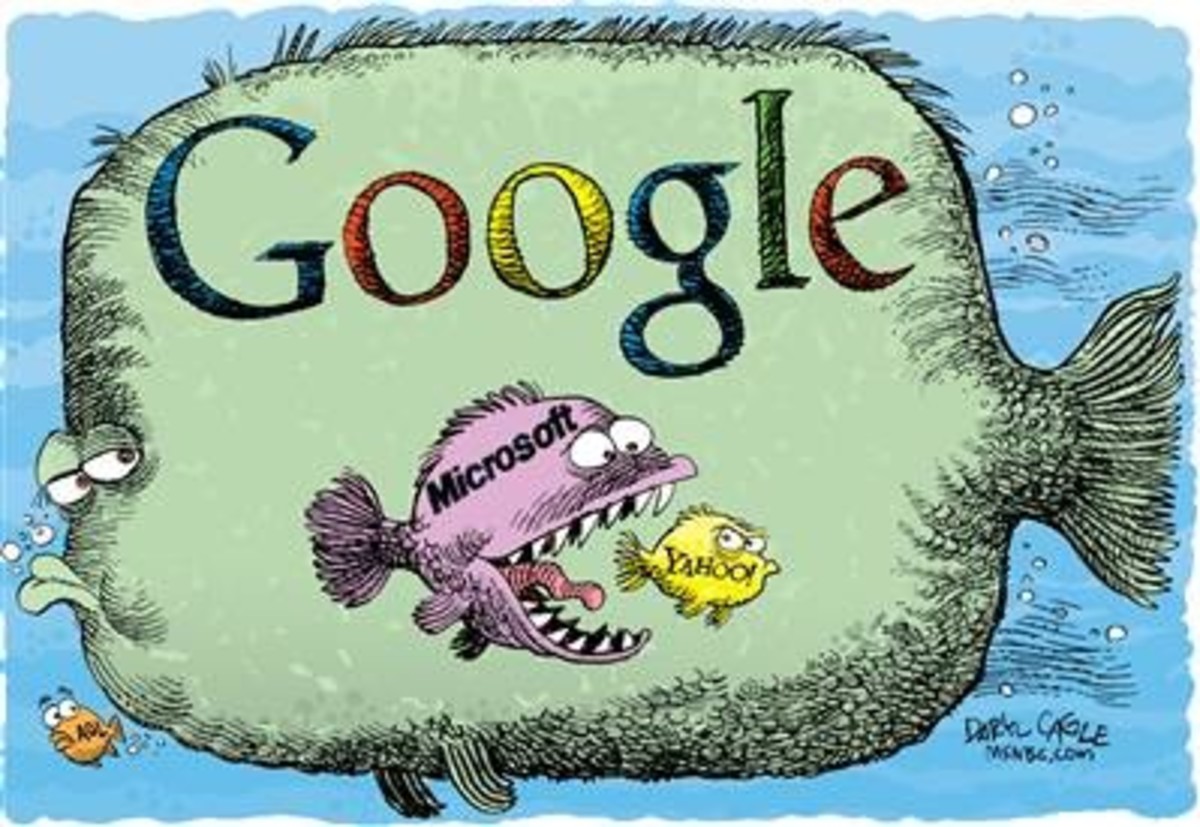Yahoo! The Road So Far.....
Yahoo! CEOs

Yahoo! The Road So Far....
Yahoo! began as something innocent between Jerry Yang and David Filo. A simple Internet Directory of their favorite websites on the web. This innocent and non-intentional endeavour became an Internet Empire. Yahoo! was the first website to gain mainstream popularity. It is one of four of the major Internet Companies of the 1990s to continue lead an Industry that they pioneered.
Like any company, Yahoo!’s success and failures depends on the CEO who is leading the company. Yahoo! had six CEOs and two acting CEOs. Many of these CEOs shaped Yahoo! to what it is today through their vision and leadership skills.
Jerry Yang & David Filo (Chief Yahoo! aka CEO 1995)
During Yahoo! infancy as a corporation, Jerry Yang and David Filo were the founders and quasi CEOs of Yahoo! until a true CEO can step up and lead Yahoo! into business prosperity. They refused to take the CEO title and called themselves Chief Yahoo! as their form to rebel against typical corporate culture.
Many tech companies of the 1990s were still formal in corporate culture, it was common to go to work at a tech company dressing in business attire. Jerry and David’s goal was to make Yahoo! corporate culture as informal as possible. A decade before Google popularized it in the Media.
Timothy Koogle (Founding CEO & President 1995-2001)
Timothy Koogle joined Yahoo during its early days. He was an executive of Motorola and respected in the tech community. His first action as CEO, was introducing the selling of advertising space on Yahoo!, which was controversial as the founders didn’t want to make Yahoo! commercial. It was also controversial among other web community as the original intention of the Internet was for educational purposes. Other web companies followed Yahoo! direction and it was common for websites to have advertisements.
During the late 1990s, when any company with dot-com in the end made individuals instant millionaires, Yahoo! was the leader. AOL (America On-Line) may have introduced America and other parts of the world to the Internet, but it was Yahoo! that organized it and became a catalyst for any website to become popular. A decade before, social networking companies like Facebook. Koogle’s approach to running Yahoo! was a “build it and people will come” type of attitude. His continued success as CEO is due to the naïveness of early web users who were trying anything out.
He leveraged Yahoo! stock price and growth as leverage to acquire companies, some in the billions without actually putting any cash upfront. This gave Yahoo! the edge it needed to stay relevant and remain popular, but it had no definitive plan on what Yahoo! should become.
After the dot-com bubble burst, Yahoo became portfolio of popular websites. Yahoo! investors demanded a clear and present plan of what Yahoo! is or is going to become. Timothy Koogle resigned CEO in 2001, but remained as its board’s chairman for a few more years.
Terry Semel (2001-2007)
Terry Semel is a prime example that because you were a successful CEO in a company of one industry doesn’t mean, your leadership skills will benefit a company of another industry. Terry Semel was CEO of Warner Bros. Studio, was considered a dealmaker and a savvy business individual. This is where the praise ends for Mr. Semel. He had no technology background and never used an email in his life. So why the board of directors, chose someone who had no experience in technology, will confound skeptics for decades to come.
Mr. Semel did make a few accomplishments for Yahoo!, many of which Yahoo! is reaping from even today. During the Semel era, Yahoo! established a definitive business plan of what it should become, a Digital Media Company. He made major acquisitions of dot-com era businesses that were struggling to streamline and to consolidate Yahoo!’s consumer worldwide reach. He made investments into many start-up internet and technology companies, such as Google; which Yahoo! surely regrets the decision, now. He also authorized an investment into Alibaba, which was considered an expensive investment at the time, but it is being praised now as one of the best investments in Yahoo! history.
The Semel era turned Yahoo! into a true business, but it lost its technological edge. Jerry Yang worked with Semel in many of the technical aspects and the technical directions that Yahoo! took. This wasn’t enough, as Google was taking over the Internet and Semel’s lack of technological background didn’t give him an edge to steer Yahoo! into an innovation vision.
Jerry Yang (2007-2009)
Jerry Yang was the company’s founder and him taking over as CEO was initially considered a great choice. He had a technological background and his vision was clear for Yahoo!, it is a Technology Platform Company. Yang’s vision was basically turn Yahoo! into a catalyst for the entire web through various partnerships. This vision was clear even in the beginning days of Yahoo! through its various partnerships.
Unfortunately, the Yang era was plagued by Microsoft’s attempt for a hostile take-over, the economic meltdown of 2008 and 2009, and Carl Icahn’s attempt to oust him as CEO. Yang is a clear example that being the CEO of a tech company doesn’t just require an innovative vision, but a warrior for when war comes. As a publicly traded company, you have enemies in the outer walls (potential hostile takeovers and competitors) and the inner-walls (your major shareholders). Make the wrong move and bleed, anyone inside or outside your walls will come on the attack. Jerry Yang would have been the perfect CEO during the good times of Yahoo!. As Michael Corleone in the Godfather said to Tom Hagen, “You are not a war-time consigliere, Tom” Jerry Yang was clearly not a war-time CEO, as he resigned a little over a year after taking the position.
Carol Bartz (2009-2011)
Carol Bartz was a successful CEO who helped turn Autodesk into a billion dollar company. Her leadership background in technology was meant to help Yahoo! become a serious competitor to Google, but sent it to oblivion. Her era as a CEO is just a blatant violation of everything Yahoo!. She basically gave away the search business to Microsoft, which resulted to a billion dollar drop in revenues. She removed free meals and many amenities that Yahoo! employees enjoyed. Every decision that she made on the behalf of Yahoo! was a clear antithesis of what Yahoo! and every tech company represents. She was ripping Yahoo!’s soul of creativity and innovation. Her tenure as CEO is solely responsible for putting Yahoo! into a path of ridicule.
Scott Thompson (2012)
Scott Thompson’s era as CEO was short. His was ousted for lying on his résumé and did nothing innovative to Yahoo! back to the light. As the head of a public company, you are expected to have integrity to the eyes of the shareholder. Therefore, a small lie can always escalate to larger ones and it was good that he was removed, sooner rather than later.
Marissa Mayer (2012-Present)
When Mayer was first announced that she will take over as CEO, it was rejoiced as the coming of Christ amongst Investors, Yahoo! Skeptics, and Yahoo! Employees. David Filo, company founder and Chief Yahoo! Publicly supported Mayer’s joining of the company he founded and helped build. Mayer was a prominent Google executive who helped shape the way Google looks and feel. She pioneered online mapping service to help Google become the number 1 online map provider. She was the highest ranking female executive of Google and well respected in the tech community. Her surprise arrival came with a lot of optimism for the future of Yahoo!
Immediately, she implemented policies that immediately improved employee morale in the company, such as free meals and free Smartphones. She began updating many of Yahoo!’s flagship products to make it mobile friendly, which resulted to dramatic usage increases. Before her arrival, Alibaba bought back 20% of Alibaba stock for about $4 billion dollars and the money just cleared the bank. These new funds gave Yahoo! The ability to go into an aggressive acquisition mode. She gave Yahoo! A definitive plan that it is not only a digital media company, but a technology platform company; a decision that Jerry Yang publicly stated what Yahoo will become years before.
Yahoo! is on a rebound. Focusing on mobile and re-emphasizing its technology roots. The stock price has jumped as high as 70% as of August 2013, since Mayer took over as CEO. This price jump is mostly a result of the vigorous Stock Repurchasing Plan, Alibaba repurchase of its stock for $4 billion dollars, and a potential IPO of Alibaba which could further add billions of dollars into Yahoo! Bank account. There is a lot of investor confidence in Mayer’s leadership. She has only begun her journey into transforming Yahoo! Into a technology platform. One thing is certain, many companies have come and gone in this industry, but Yahoo! has remained the constant force of the internet industry.
UPDATE: Under Mayer's leadership, she has made some power buys such as Tumblr, Summly, Qwiki, and more. Mayer is clearly acquiring talent and technology to make Yahoo! Relevant again. Between Alibaba's pending IPO and Yahoo! stands to make another $10-$20 billion, depending on Alibaba's IPO price, Yahoo! will definitely have enough cash to stand up against any threat and to innovate any product. Yahoo! should definitely start investing into Internet Of Things, which is the next big Internet Bubble.







